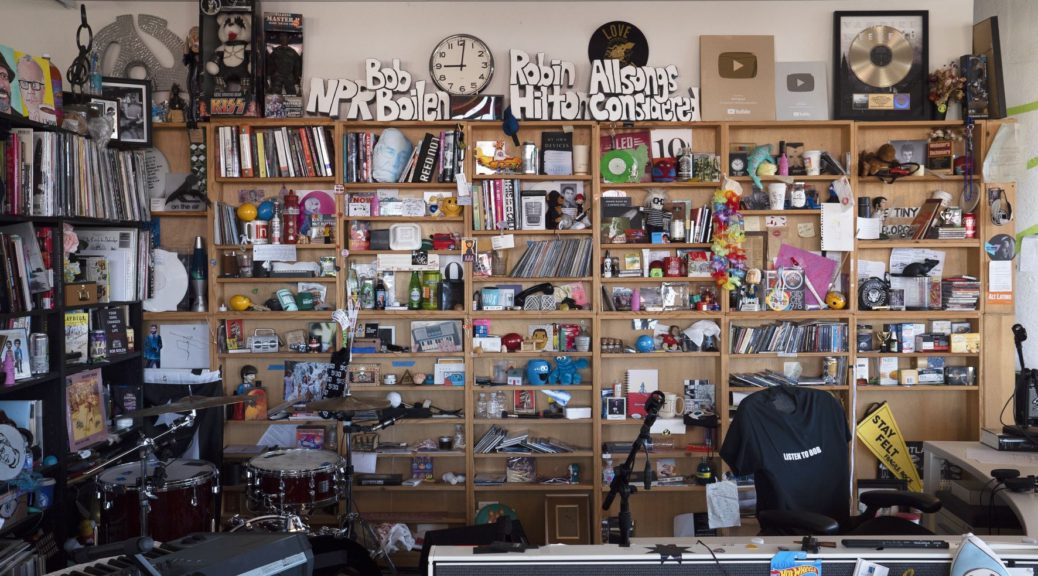NPR’s Tiny Desk Concerts are spectacular. They’re a YouTube series of small-scale, exquisitely produced sets from the NPR music office in Washington DC which focuses mostly on quirky indie rock. In its long run since 2008, Tiny Desk has hosted a deep roster of musicians, both small and big names, and the intimate setting facilitates unique takes often lost in hyper-refined studio album versions or live stadium sets.
Tiny Desk has broadened my horizon of music, far beyond the comparatively staid classical music from my childhood. I’ve hardly listened to them all (they’re thrice weekly now), but let me tell you about five memorable moments:
T-Pain: “Buy U a Drank” ad lib (Oct. 2014).
For years, this T-Pain set was Tiny Desk’s most popular video, and for good reason. It turns out the man who was vilified for pioneering autotune as an artistic choice never needed that autotune as a crutch. He’s a magnificently talented soulful singer, and this jarringly different acoustic rendition of his biggest party tracks laid bare his natural singing voice. Sans vocoder (and sans his signature top hat), this set convinced many — including me — of his merit as a singer. Sadly, it wasn’t enough. He returned five years later to win the first season of the Masked Singer, where none of the judges recognized his unprocessed voice. What a shame.

It highlights T-Pain’s innovation and the durability of the music he wrote. Even though the sonic texture is so different, it’s still very much “his song.” The sonic contrasts enabled by modern electronic instruments and post-processing are refreshing. However, without them, there are still contemporary themes, the presence of lyrics, and sheer originality of musicians playing their own compositions. I still listen to modern music with a classical musician’s ear, but I admit we’re a little stuck playing covers of revered pieces from a pantheon of dead white dudes, confined to instruments in a symphonic orchestra. T-Pain makes cool music.
Snarky Puppy: “Xavi” bass run and audience polyrhythm clapping (Nov. 2019).
Tiny Desk introduced me to the joyful, complex, jazzy collective that is Snarky Puppy. This set is strange, where the bassist and leader Michael League spends a third of the allotted time teaching the NPR office how to clap 4:3 polyrhythms. Hilarious. The first track also opens with a solo duel between a talkbox solo and a keyboard with a whammy bar as big as the rest of the keyboard. What.
Snarky Puppy’s long, ambitious, and complex songs aren’t easily relegated to background music. Instead, they’re more suited towards listening with intent. Snarky Puppy’s music reminds me of how my college roommate used to listen. He had music he’d put on for studying, but when he (an audiophile and audio tech) really wanted to experience new music or appreciate his old favorites, he’d prepare either his nice headphones or elite speakers and then sit down to listen. Like really listen. I don’t know if he listens to Snarky Puppy, but I can easily envision him jamming out to the “We Like It Here” live set, flush with its multi-piece percussion backing, flowing solos, and groovy baselines.

Black Pumas: “Fire” belted octave leap (Dec. 2020).
I overheard this video while Katie was watching, and this specific moment blew me away (it inspired this post). Eric Burton’s singing talent and musical sensibilities are breathtaking. People can sing like this?! Just… listen. It’s amazing.
I’ve started listening to the podcast Song Exploder, hosted by Hrishikesh Hirway. It’s a great way to learn about the production work behind tracks, and it offers glimpses into the personality of the artists and the backstories of songs. On the Black Pumas episode, they reveal about the serendipitous encounter between the singer Eric Burton and (Grammy-winning) producer Adrian Quesada that initiated their collaboration.

In the age of COVID, they’re playing Tiny Desks not at the NPR office but instead “from home.” No matter from where they play from, they maintain their signature crystal-clear audiovisual production, even if they do lose some of the intimacy from when artists play live for NPR staff. However, Tiny Desk was evermore important during quarantine time, where virtual venues like these helped us feel still connected to musicians.
Jacob Collier: “It Don’t Matter” everything-percussion intro (Jul. 2019).
This video introduced me to Jacob, and I instantly became a huge fan. I’ve listened to his music more than any other artist’s in the two years since, and I hope to witness his live show someday.
A stupidly talented hyperactive multi-instrumentalist wunderkind, Jacob Collier (real name: Jacob Moriarty (awesome)) sings while playing piano, bass, guitar, percussion, and an instrument he helped invent called a harmonizer. He slings around hundreds of a cappella tracks to explore the absolute forefront of harmonic theory. His musician persona is endearingly childlike, with his juvenile haircut, colorful jackets, floofy print pants, and barefoot feet (or rainbow Crocs). He earned his fame through his home-grown unnecessarily complicated displays of musical mastery as a teenager. He won two Grammys when he was 22, years before this Tiny Desk set.
At Tiny Desk, he already showed signs of musical maturation. For him, maturity came in the form of restraint, not constantly cramming as much music theory into each song as possible. “It Don’t Matter,” in particular, is a distilled encapsulation of Jacob’s carefree musicality.
He actually returned one year later with a self-produced Tiny Desk set to begin NPR’s string of home concerts. In another display of technical mastery, he converses with himself by coordinating four separate one-take tracks (Jul. 2020). You should definitely also listen to the following track “Time Alone with You.” It’s mad impressive, the foresight needed to harmonize with himself four times over while playing an entire band of instruments.
Hopefully I’ve provided you with 90 minutes of enjoyable listening. Other notable (from my perspective) Tiny Desk sets I could’ve written about include Tigran Hamasyan, The xx, Chvrches, Aurora, and Ólafur Arnalds.

Images from npr.org and giphy.com from the artists’ and the Recording Academy’s accounts.
